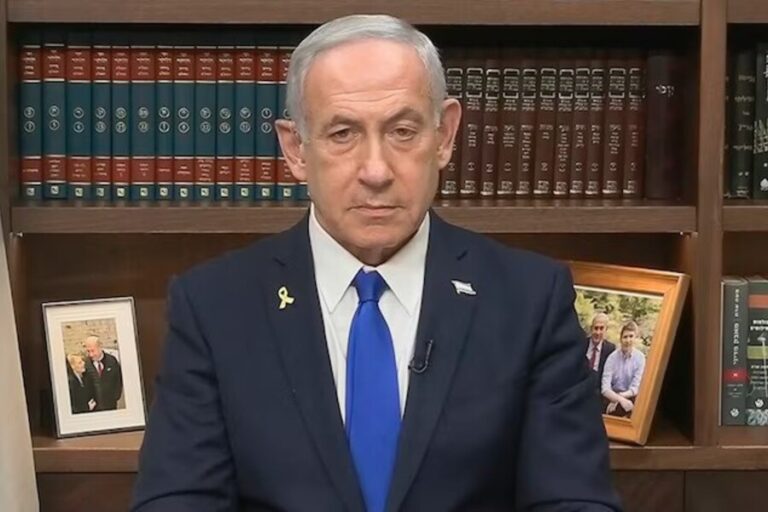In a high-stakes interview with ABC News, Israeli Prime Minister Benjamin Netanyahu made headlines Monday by refusing to rule out a direct strike on Iran’s Supreme Leader, Ayatollah Ali Khamenei, amid the most severe escalation between Israel and Iran in years. Speaking with ABC’s Chief Washington Correspondent Jonathan Karl, Netanyahu argued that such an action would end the regional conflict rather than worsen it.
“It’s not going to escalate the conflict; it’s going to end the conflict,” Netanyahu said when asked about reports that former President Donald Trump had previously rejected an Israeli proposal to assassinate Khamenei.
The prime minister’s remarks come at a time of mounting violence and a rapidly deteriorating security landscape. As of Monday, Israeli officials confirmed 24 Israeli deaths and nearly 600 injuries due to recent Iranian missile strikes. Iran’s Health Ministry reported 224 deaths on its side, following Israeli retaliatory attacks, many of which have targeted Iranian military infrastructure and suspected nuclear sites.
Netanyahu defended Israel’s aggressive military posture, describing the Iranian regime as the architect of regional instability for more than 50 years. He cited Iran’s involvement in the 2019 drone attacks on Saudi oil facilities, its support for militant proxies across the Middle East, and its nuclear ambitions as clear evidence that Iran seeks to provoke a perpetual state of conflict.
“The ‘forever war’ is what Iran wants,” Netanyahu asserted. “They’re bringing us to the brink of nuclear war. What Israel is doing is preventing this… by standing up to the forces of evil.”
When asked directly if Israel would target Khamenei, Netanyahu responded vaguely but provocatively, stating, “We’re doing what we need to do… We’ve targeted their top nuclear scientists. It’s Hitler’s nuclear team.”
The Israeli leader framed the conflict in global terms, warning that Iran’s ambitions extend far beyond Israel’s borders.
“Today, it’s Tel Aviv. Tomorrow, it’s New York,” he said, referencing Iran’s “Death to America” slogans. “I understand ‘America First.’ I don’t understand ‘America Dead.’”
Netanyahu emphasized that Israel’s campaign against Iran is not just in its own interest but also in the service of global security. He credited President Trump for recognizing this reality and supporting Israel’s military efforts.
“We are doing something that is in the service of mankind… a battle of good against evil,” Netanyahu added.
Despite Netanyahu’s overtures, not all American conservatives are aligned with Israel’s actions. Prominent commentator Tucker Carlson recently wrote that the U.S. should stay out of a war with Iran, offering “no funding, no American weapons, no troops on the ground.”
Netanyahu dismissed this perspective, asserting, “We’re not just fighting our enemy. We’re fighting your enemy.” He reiterated that Iranian hostility toward America is not hypothetical but a clear and present danger.
“Sometimes you have to take a stand against evil… That’s what the American people instinctively understand,” he said.
Amid the intensifying conflict, the U.S. State Department updated its travel advisory Monday, categorizing Israel and the West Bank as “Level 4: Do Not Travel.” The advisory reflects increasing concerns over regional security and the potential for further escalation.
When pressed about whether he would heed a hypothetical request from Trump to halt military strikes and return to diplomacy, Netanyahu gave no clear answer. Instead, he questioned the sincerity of Iran’s willingness to negotiate.
“They don’t want a seat at the table — they want to blow up the table,” he said. “They’re stringing the U.S. along.”
He dismissed a Wall Street Journal report claiming Iran has signaled interest in halting hostilities and returning to talks. Netanyahu said Israeli intelligence suggests otherwise and claimed Tehran continues to covertly build nuclear weapons and expand its ballistic missile arsenal.
Iranian Foreign Minister Abbas Araghchi responded to the Israeli strikes on Sunday, accusing the U.S. of enabling the attacks. In a meeting with foreign ambassadors in Tehran, Araghchi said:
“Israel’s attacks could not have happened without the agreement and support of the United States… If the international community is indifferent to these red lines, it will certainly have consequences for all other countries.”
In response, Iran suspended scheduled nuclear negotiations with the U.S. in Oman, originally planned to resume on Sunday.
The widening rift between Israel and Iran now threatens to engulf the broader region in conflict. While Trump has been vocal in supporting Israel, he declined to detail what actions, if any, would lead the U.S. to join the conflict militarily. Asked Monday at the G7 summit in Canada about possible American involvement, he simply replied, “I don’t want to talk about that.”
Netanyahu, for his part, stopped short of requesting direct U.S. military action but made it clear that Israel is prepared to act alone if necessary.
“We’re fighting against a regime that hates us both,” he said. “Sometimes you have to take a stand… And that’s precisely what America is doing under President Trump.”
As tensions reach a boiling point, the possibility of full-scale war between Israel and Iran appears closer than ever. Netanyahu’s refusal to rule out high-profile assassinations and his stark language about nuclear threats have intensified global anxieties. Whether through diplomacy, deterrence, or confrontation, the coming days are likely to shape the trajectory of one of the most volatile geopolitical standoffs in decades.
